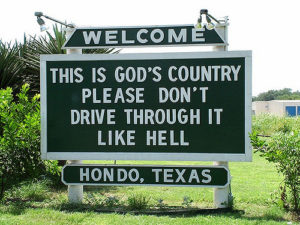Living in God’s Country
Rise up, O God, judge the earth,
for all the nations are your inheritance.
Psalm 82:8
 Would you like to live in God’s country? I imagine you would. I would too.
Would you like to live in God’s country? I imagine you would. I would too.
But where exactly is God’s country? Plenty of people think they can answer that question, because they claim to live in God’s country. I’ve heard people in Montana, New Mexico, California, and Texas refer to the place they live as God’s country. Usually, what they mean is that the area where they live is filled with natural beauty, unspoiled by civilization. (How interesting that cities are not “God’s country,” even though the vision of new creation in the future features a city. See Revelation 21-22.)
Others somehow think of our own country as God’s special country. Many Americans freely apply Old Testament language for Israel to the United States, believing that this country is uniquely chosen and blessed by God. We are the city on a hill (see Matt 5:14). But citizens of other nations also can think of their countries as divinely favored.
The truth, according to Psalm 82, is that every country on earth is, in some sense, God’s country. Verse 8 reads, “Rise up, O God, judge the earth, for all the nations are your inheritance.” The Hebrew word translated here as “nations” is goyim, a word that often means “Gentiles.” It is used by Jewish people to identify non-Jews in particular. How striking to see that the Jewish author of Psalm 82 recognizes that all nations, all goyim, including but not limited to Israel, ultimately belong to God as his inheritance. For this reason, God has the right to judge the whole earth because it all belongs to him.
Recognizing that all nations belong to the Lord does not mean we have to denigrate our own country. We can still love our country or the place we live within it. And we can still think of it as God’s country because, indeed, it actually is. But we must remember that any other person in the whole world could rightly make this same claim. God is King of kings, the ultimate sovereign over all nations. He uses all peoples and countries for his purposes and glory. Thus, even as we esteem the places we live and feel patriotic toward our own country, we do not discount other places or nations. We acknowledge, with the psalmist, that all nations are God’s inheritance, that all countries belong to him.
QUESTIONS TO CONSIDER:
What difference might it make in your life if, indeed, all nations belong to God?
How might this impact the way you think about the place you live, your workplace, your country, and the broader world?
PRAYER:
Gracious God, King of kings and Lord of lords, today I remember that you are God of all nations. All countries belong ultimately to you. All exist for your purposes. All are meant for your glory.
In that vein, I pray today for my own country. I offer thanks for all the ways this country reflects your goodness and justice. I pray for all the ways we fall short. Help us, dear Lord, to be a nation that honors you and reflects your justice.
In that vein, I pray for my leaders, for those who serve in national, state, county, and city government. May they seek you and your ways. May their decisions be guided by your wisdom. May they be passionate for your justice and truth.
All praise be to you, King of kings and Lord of lords. Amen.
Image Credit: Welcome to Hondo, TX sign by bukwheat, CC BY-NC-ND 2.0
Explore more at the Theology of Work Project online commentary: God’s Call to Justice

Mark D. Roberts
Senior Strategist
Dr. Mark D. Roberts is a Senior Strategist for Fuller’s Max De Pree Center for Leadership, where he focuses on the spiritual development and thriving of leaders. He is the principal writer of the daily devotional, Life for Leaders,...


